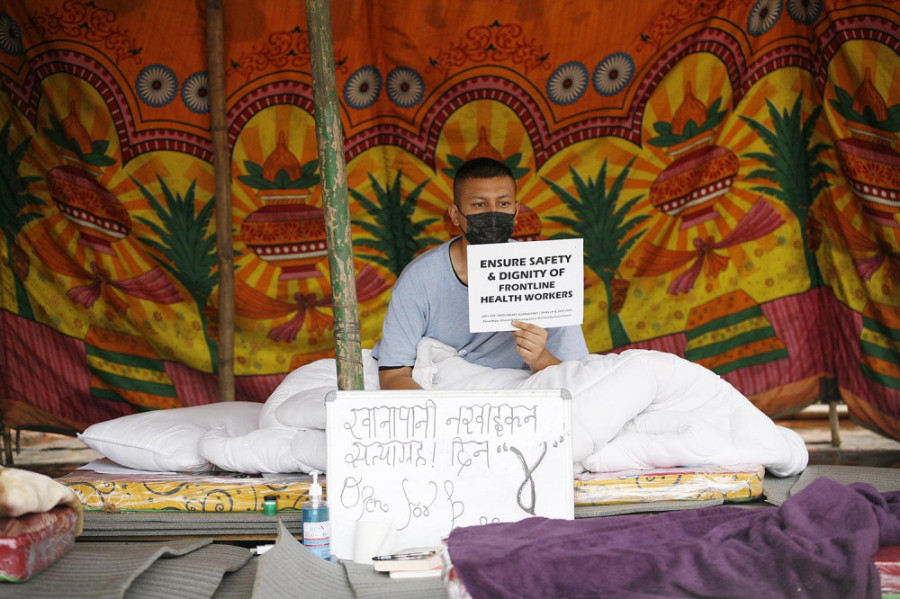National
Three youths go on a second hunger strike over pandemic handling
Youths demand the government fulfil its earlier commitments while government say all demands have been met.
Aditi Aryal
Three youths representing the “Enough is Enough” campaign have once again started an indefinite hunger strike after the government failed to act as per the agreement made with them earlier this month to handle the Covid-19 pandemic in a better manner.
Two of them, including the organiser of the movement, have been on strike for the past four days while the third one joined them on Monday.
The government had signed a 12-point agreement with the spontaneously formed youth group on July 7 to make the government more accountable in its dealing with the pandemic after 12 days of hunger strike.
“If the government fails to act on our demands within a week, I will stage another hunger strike,” Iih, who had gone on hunger strike of this “leaderless” campaign, had told the Post from the hospital the day the agreement was signed.
The second person in that hunger strike, Pukar Bam, too had expressed doubts about the government fulfilling its part of the agreement.
“Despite the government signing many agreement documents with Dr. Govinda KC to end his hunger strike, they were not implemented,” Bam had said.
The agreement had been signed after Prime Minister K. P. Sharma Oli visited the two at a private hospital on 3 July after their health deteriorated.
Their apprehensions have come true.
The 12-point agreement included increasing polymerase chain reaction (PCR) tests to at least ten thousand per day, doing away with the controversial Rapid Diagnostic Tests (RDT), compulsorily quarantining people returning from abroad for a minimum of five days and releasing them only after testing, tracing contacts of people who have been diagnosed with Covid-19 and testing them, ensuring dignity and safety for health workers and essential workers, and making public the pandemic related expenditures.
The Ministry of Health and Population had agreed to fulfill all these demands within seven days following which the two had ended their hunger strike.
According to Dr. Jageshwor Gautam, the ministry spokesperson, all the demands that had been put forth and agreed upon have been met fully.
“Presently, only about 2,500 people enter the country every day, which is a drop in the figures from earlier. This is why the number of tests has been reduced,” he said and claimed to have expanded testing in communities as well.
“A PCR test costs about Rs 5,500, which when done 10,000 times a day would be extremely expensive. We need to prioritise our spending and ensure there’s enough budget to procure medicines and other supplies too,” Gautam told the Post when asked about the decrease in PCR tests across the country. “We cannot burn all our money only on tests.”
However, a huge incentive for the protesters for ending their hunger strike was the guarantee that PCR tests would be increased, which was their main demand.
The government has not stopped using RDTs, either, which was the third point of the agreement.
“We have been receiving various messages from different parts of the country where people in quarantines have been sent home without being tested, or are only being tested by using RDTs which the government had said they had done away with completely,” a campaign member told the Post, requesting anonymity for fear of repercussions.
Gautam said continuing the controversial RDT was as per the demand of the situation.
“When people have been in quarantines for two to three weeks, we sometimes need to test them using RDTs for a more accurate diagnosis,” he said. “Given there are fewer instances of people falling sick all over the country, we’re taking informed decisions as guided by public health experts.”
However, according to Dr. Anup Subedi, a public health expert, RDTs do not correctly determine whether there is an active infection, which renders the entire task futile. “RDTs were incorrectly done in the past because there were kits that were available but their use should be discontinued since it cannot detect whether the person is currently infected with the virus,” he said.
When Gautam was asked about the second phase of the hunger strike and that the protesters do not agree with the ministry’s argument that how all their demands had been met, he told the Post, “It is their right to protest and they are doing it again, but we’ve complied to all their demands and have implemented them already.”
Despite Dr. Gautam’s claims, some demands remain to be met.
The government has yet to disclose details of its spending on the pandemic, which it had assured to do so within a week of signing the agreement. Similarly, the Ministry of Health and Population has not issued guidelines on issues such as protection for healthcare workers and essential workers and on managing the operations of quarantines, especially for women and ethnic minorities.
According to Tulsi Ram Sapkota, a 32-year-old who returned from South Korea on July 18, the quarantine facility in Pokhara Stadium which also serves as the holding centre for returnees to Gandaki Province, was ill-maintained.
“I was supposed to stay there for the night but the living conditions were horrible so I had to sleep inside the bus I had rented. The toilets were unusable and smelled foul and the personnel in charge treated us like we weren’t human beings,” he said.
Sapkota quarantined at home since he had tested negative for Covid-19. However, he received no guidelines on how to quarantine at home, which was the first point of the agreement the government had signed with the protesters.
The campaigners are not willing to sit down with the government for discussions this time.
“We signed a deal with the health ministry but our actual deal was with the prime minister who had come to see us in the hospital,” Iih told the Post. “We have put forth our demands, the government knows what we want, and I’m not going anywhere until they’ve been addressed. The government has proved its incompetence but it should also be willing to take accountability for the catastrophe that will ensue due to its negligence.”




 21.02°C Kathmandu
21.02°C Kathmandu













